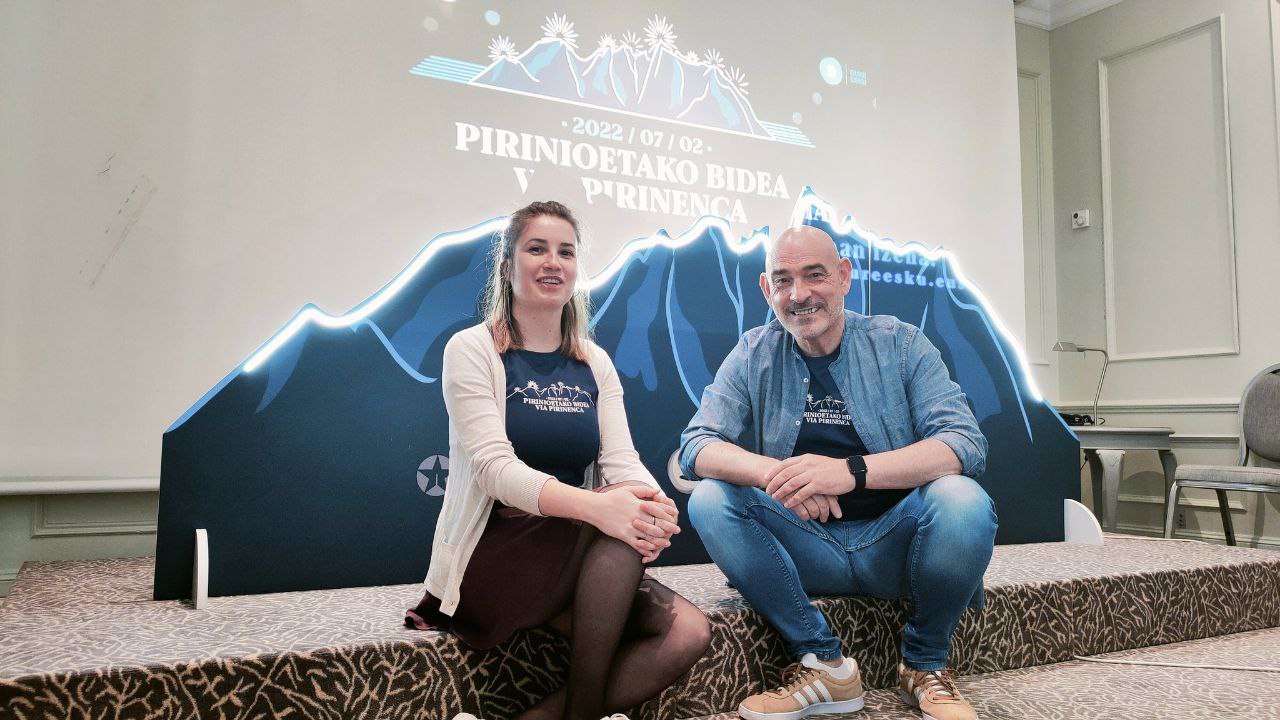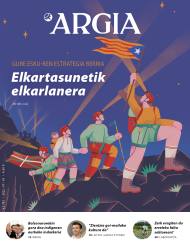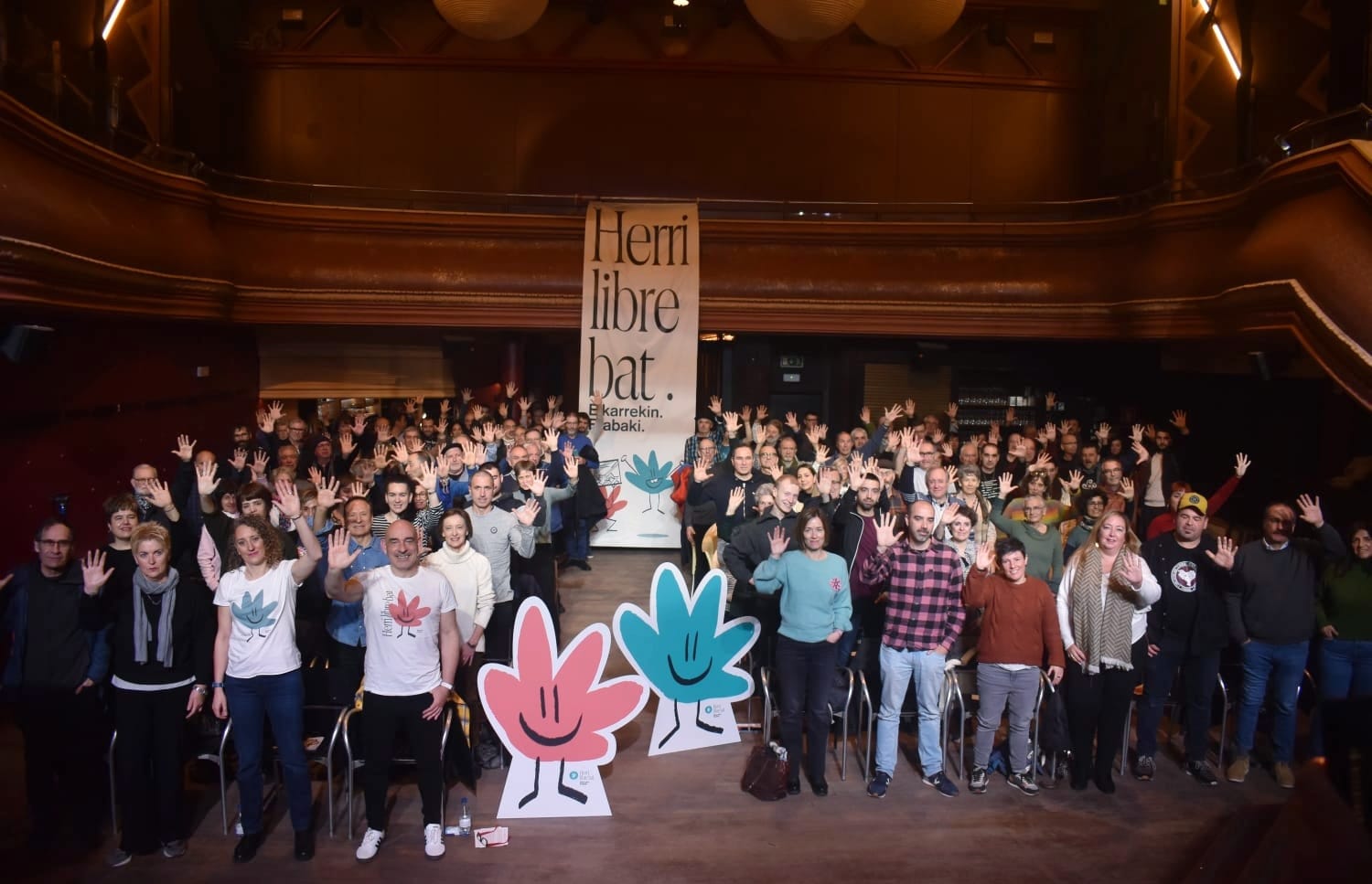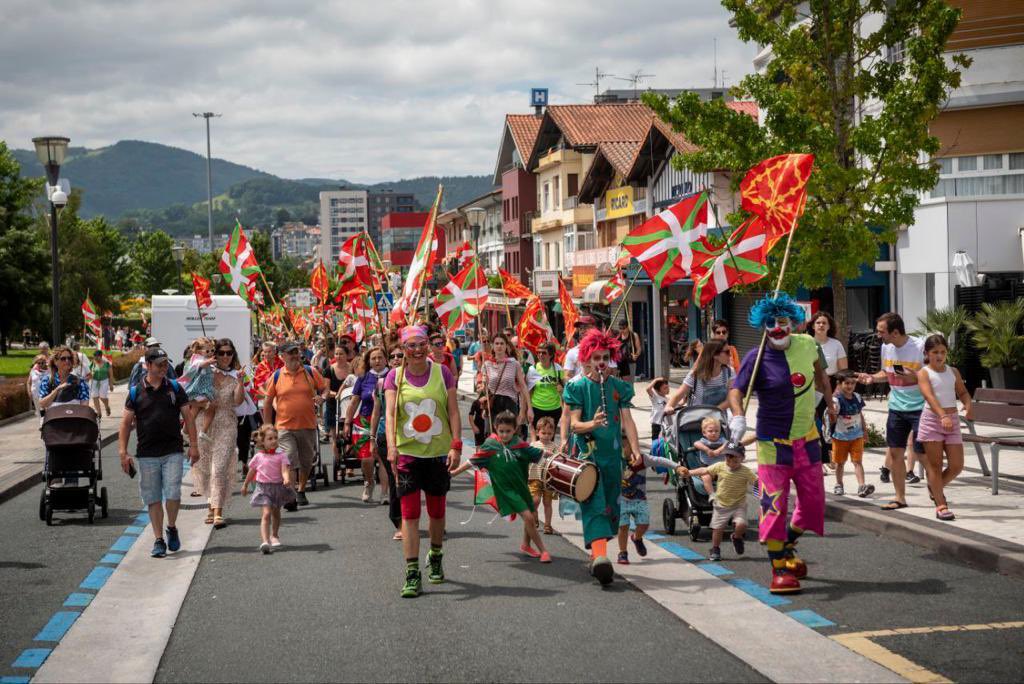Changing posture, Tours Esku comes with the intention to move the matches
- The Pyrenees initiative, with the main Catalan sovereign social players, will be organised by Šesku on 2 July. It is a question of sending a message to the international community by illuminating the summits that link the Atlantic with the Mediterranean: Euskal Herria and Catalonia need a political solution and the right to decide must be implemented by means of self-determination referendums. But that is very difficult, and with the excuse of the initiative, we have met with the spokesmen of the movement that is 9 years old to talk about the political situation and the strategy used by CincEsku. We have valued them speaking sincerely.

Every time they talked about the initiative they highlighted: It is not a question of illuminating the Pyrenean summits, but of revitalizing the popular desire to start a process of sovereignty, to reactivate the Inca Esku movement, to put groups in towns and neighborhoods, which do not want to leave the issue of the right to decide in the hands of the parties without close monitoring. Hence the interview with the spokesmen. Beyond the Pyrenean initiative, what do they conceive from the ground?
Amalur Alvarez (Donostia, 1988) speaks clearly. At the bottom it is tired of the political situation, even those close to it. The reasons may be the disaffection caused by the political blockade of recent years, the pandemic and the tensions between the parties or the blockade of the Catalan process to cite some. He points out that at the CAPV level, although steps were taken in the previous legislature, this time the issue is underway and has made self-criticism, both internally and externally. It should be remembered that in 2018 San Sebastian, Bilbao and Vitoria joined with a massive human chain, ending in the Parliament of Vitoria and symbolically trusting as a popular movement to political parties within the framework of the right to decide to enter and move forward in the debate on the new status. But with the disappearance of social pressure, the issue is blocked for four years. This has led to unrest at the base of Ns Esku and they are clearly not going to repeat the mistake, they have to change their attitude. “We have learned from our mistakes, we have changed the chip. Our goal is to return with another force to the political landscape and during the course we will maintain that tone, we will be on top, caring and being rigorous”.
Josu Etxaburu Osa (Ondarroa, 1961) believes that the pandemic and the following two years have been very painful because of the inability of collective action. In addition to highlighting social priorities, the need for emancipation has been highlighted. At the same time, it is clear that Cincts Esku was born to fight strong political currents, and that that is always complicated. Therefore, despite the current environment, it values what has been done for 9 years. “We have had to do a comprehensive pedagogy about the right to decide, and in these years the work of Christians in the villages has been done to activate people.” According to Etxaburu, “now is not the time”, they face what they say “want to divide society” or “don’t touch”. “What doesn’t touch now? Well, let’s make it touch.”
Alvarez has recovered and endorsed the statements made recently by the two Donostiarras spokespersons in the weekly Irutxuloko Hitza: “We’re fed up with moving balloons and we want to build a process.” They believe that the only way to do so is for the fundamentals of our Hand to internalize that attitude.
Territoriality, always a complex issue
As a project of Escku Euskal Herria, we have asked them how they experience the issue of territoriality. They recognize that, although they have tried to do special surveillance, it is complicated, that from Navarra and Iparralde they sometimes receive centrist initiatives in the CAPV, as if they were thrown away from the reality of the CAPV. In the last two initiatives, they have emphasised that territoriality has been carefully considered: with the collection of signatures by the Hamaika gara sovereignty, the territorially adapted petitions have been accommodated and now, for example, with the Pyrenean initiative, special work is being done in Navarre and many groups have been set up. “We are clear that the political process in Euskal Herria has to respect the three administrative realities, and that there will probably at first be three different processes that at a given moment will emerge convergence”.
From an institutional point of view, the parties have recently been questioned in the Basque Parliament to incorporate legally the right to decide in the new status, and they follow the steps that are also taken in Navarra, meeting with parties and movements. With new actors such as Nafarroa Berriz Altxa or Nafarroa XXI, they see that they share the foundations: open the debate on the right to decide or on self-government, citizen participation and complete the process in a referendum.
“The Pyrenean initiative aims to set the framework: We are in Europe and Catalonia and Euskal Herria together”
Amalur Alvarez
Etxaburu considers it important that the work around the Basque Country be carried out with all due respect. “It is clear that they imposed the separation on us, they did not ask us, but to turn it around, we have to make our own way to each area, getting majorities on the democratic path, each at their own pace, all in the same direction: The consolidation of Euskal Herria”.
As the pandemic has been mentioned, the journalist has pointed out that the Basque Country of seven territories had weakened as it left the era of confinement, because the territorial closures placed walls between geographically very close localities and hardly ever did so – except for some border protests between Navarre and the Northern Basque Country – or because, for example, the president of the CAV preferred to open borders with the province of Navarre. “Yes, of course, it was very painful for many Basques, because those gestures are very significant to imagine which country project each has in its head. I believe that the pedagogy of Euskal Herria must be strengthened, and that’s not only up to Decks Esku,” concludes Etxaburu.
With the Catalans what?
It is clear that, following the events in Euskal Herria and in Catalonia, the sovereign movements of both countries, and for example the signing of the Llotja de Mar Agreement by the independence political parties, are a new paradigm in the framework of the political problems pending with the Spanish State, including the international community. They're asked where exactly the collaboration comes from.

Roger Torrent's speech in Vitoria-Gasteiz quickly comes to Etxaburu's head. In addition to thanking the demonstrations of solidarity, the then President of the Catalan Parliament put on the table that the challenge of Catalonia and the Basque Country was to work together. It considers that the focus should be changed to the Spanish State, to make it clear that this was not a problem of Catalans or Basques, but of Spain, because it does not give democratic solutions to the peoples it has subordinates. “We have to put the state in a port, and we have to tell the international community that if there is no democratic solution we demand a different intervention. He is absolutely right.”
Álvarez recalls that in the context of the popular consultation to be held in San Sebastian in 2018, two lawyers met: Miguel Castells and Benet Salellas. They spoke of parallels between the Burmese process and the opposite of the Catalan social and political leaders and concluded that it was not a trial against concrete people, but of processes against the two peoples and that both are stronger by working together.
The need to go beyond the solidarity demonstrations that at that time began to repeat internally the militancy of Šesku, then in Catalonia the summit of Montserrat was illuminated, the members of Šesku began to illuminate those of Euskal Herria, relations deepened and now, after several years and after a pandemic, they want to lay the first stone with the Pyrenees Route. “We firmly believe in this path. It will bear fruit in the coming years, even if each people has its difficulties,” says Álvarez.
International response
They will do their best to ensure that the initiative is internationally recognized, and are convinced that the synchronization of sovereign movements in Catalonia and Euskal Herria will come “where necessary”, says Amalur Alvarez. “The Pyrenean initiative aims to set the framework: We are in Europe and Catalonia and Euskal Herria come together.”
The impact of thousands of people on the international media landscape will have to be seen as a signal sent to Europe by Pyrenean lighting. Although some Spanish media outlets may try to downplay certain news items, Catalan agents have done important work in recent years to internationalize their conflict and gain great visibility with their initiatives. A new factor is therefore that the media should be developed in conjunction with the Catalans for the Basque sovereign movement.
Having said that, Álvarez is clear that Europe has a clear responsibility in the Basque case. “We are European citizens and we have rights. Even if I turn my back, the conflict will not go away.”
For a consensual referendum?
The spokespeople for Šesku note that after the referendum of October 1, 2017, the agents use different strategies in Catalonia, although in the short term they are going around, and although on October 1 legitimacy is accepted, if a second referendum is held, they agree that all this must be agreed with the State. Otherwise there is no point in another referendum.
“The above will do one or the other if we move them. That’s the strength of Zion Esku and every citizen must internalize it.”
Josu Etxeburu Osa
“The reading we make of our Hand is that before a state that uses repression and violence to prevent change, it is impossible to reach agreement on the process from the very beginning. That does not mean, however, that the solution is not in agreement – says Álvarez –. In any place, the frameworks must be agreed and we must also recognise that if we want to make changes with society, with the administration, with the state, with Europe … we must go through a framework of agreement. The question is how to get there. We need everything: accumulation of forces, confrontation, unilateral steps and agreements. What is more, if we want to reach these consensus forcefully. That is going to be a solution at some point and that is what those who are now betting on one strategy or another in Catalonia agree on.”
“At Šesku we demand a consensual referendum for the right to decide, not for innocence. In these times it seems impossible, but we should not just look at this time. We are talking here about what kind of democratic intervention we have to make to the states. In this democratic confrontation I am convinced that the referendum will come. How many more years will the current state model be maintained? In addition, parts such as Scotland, Ireland or Corsica are moving in Europe. Surely we will do it later than we want, but we will do it,” says ondarrutarra.
Referendum in Basque Country?
Finally, the journalist asks if they see the PNV going to those positions, embarking on such a process, confronting itself with the state and what they will do if they do not legally recognize the right to decide on the new status of the CAV. The answer was Etxeburu: “We are not going to say what attitude each party will adopt, each party will have to tell society. We have said publicly and privately that we are not going to accept new status that does not put the right to decide at the centre and do not give the people the floor. We will give you one answer or another depending on your content.”
Álvarez sees that the tension is going to rise and that there are times of greater confrontation with the parties. “It will also take moments of agreement, we need PNV, EH Bildu, Podemos, PSE..., but if any of these parties oppose this right or try to block the initiative, we will do the work that belongs to us.” The idea that they have repeated many times throughout the interview is that Locks Esku has made self-criticism and that he will challenge the political parties with a more rigorous attitude, accepting, in some way, that he has the lobbying work.
As Etxaburu explained, Locks Esku has two lines of work: on the one hand, the street and the people, and on the other, the seam of the broad majorities, a referendum to really achieve. “We have to play our role, being self-demanding and demanding with others. We must not forget that parliamentarians are at the service of the citizens, and that is the point. Over the years, it seems that we are at their service and we have to force them to exercise democracy. We have to work to make the windows of options bigger and bigger, so that fewer and fewer phrases are used that we don't touch or that we fragment the people.
Alvarez says that it happens with all the political parties, that if they do not see clearly what they will win, they always go in the middle. However, for years he has seen that the parties give strength to the “many times more than ourselves” movement, they have very good relations and are working with the parties since December. We ask them to honour the commitments and reactivate the debate on the right to decide. “We can say that the work will start to bear fruit and that by the autumn we expect more fruits,” the Donostia says.
“Catalan political leaders joined the independence wave when society overflowed. We are cheating: as parties are not in those keys, we are not able to move forward. But the changes always come from the bottom. There are no magic formulas – says Etxeburu. The ones above will do one or more if we move them. That’s the strength of Zion Esku and every citizen must internalize it.”
“We have to get into a drip, we want to make this journey with others, we are not going alone. We want to play this game on the European court. Knowing that we don’t have as much force as the states, moving our chips, gaining awareness of the ant work we are doing now.” The aim of Cées Esku is for Euskal Herria to be in the next wave of European referents.
Bizkaian eta Gipuzkoan egin bezala, EAEko estatus politiko berriak Euskal Herria nazio gisa aitortzea eta erabakitzeko eskubidea jasotzea eskatu dute Arabako Batzar Nagusietan alderdi abertzaleek.
Frantziako itzuliak duen nazioarteko oihartzuna baliatuko du Gure Eskuk, 'Euskal Herria mundura' izeneko ekimenarekin. Tourreko lehen hiru etapak osoki Euskal Herritik pasako direla baliatuta, "inoiz egin den ikurrinik erraldoiena" zabalduko dute, eta 4.000... [+]





















